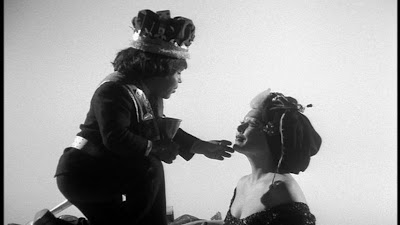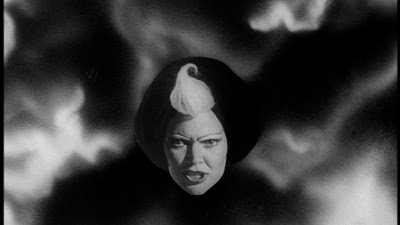(1980) Directed by Richard Elfman; Written by Richard
Elfman, Matthew Bright, Nick L. Martinson and Nicholas James; Starring: Hervé
Villechaize, Susan Tyrrell, Marie-Pascale Elfman, Matthew Bright and Gisele
Lindley; Available on Blu-Ray and DVD
Rating: *** ½
Saying that Forbidden
Zone won’t appeal to all viewers’ tastes is like stating that alligator
wrestling isn’t everyone’s cup of tea.
It’s a true cult flick, meaning that it will be an overlooked treasure
for some, and an endurance test for everyone else. I discovered this twisted little film in the
late 80s while working as a video clerk, and have never been the same
since. I felt like a pop culture
archaeologist, unearthing the missing link between one musician’s humble performance
art origins and more ambitious commercial aspirations.
Forbidden Zone
showcased the talents of director/co-writer Richard Elfman’s avant-garde
music/theatrical group The Mystic Knights of the Oingo Boingo (later just Oingo
Boingo, under the guidance of his younger brother Danny). Richard financed his ultra-low-budget film
partially by selling homes, and kept costs down by employing a cast largely
consisting of friends and family members.
Among the non-professionals in the cast were his real estate broker
(credited with the pseudonym Hyman Diamond) as Grandpa Hercules and business
associate Phil Gordon as Flash Hercules.
Richard Elfman commented that he didn’t go to film school,
which explains a lot. He claimed to have
learned about filmmaking by making this movie, which plays like a series of
sketches, rather than a coherent narrative.
Many of the disjointed scenes were derived from the old Mystic Knights
stage shows, which Richard had stopped participating in by this point. The plot, such as it is, centers around the
dysfunctional Hercules family (based on Elfman’s childhood experiences with a
neighbor family) and their adventures in the Sixth Dimension, a hoary
netherworld lorded over by King Fausto and Queen Doris.
Richard claimed that there were no drugs involved in the
making of this picture, although the end results might suggest otherwise. The black-and-white photography adds a
surrealistic dimension to the film, which is augmented by Terry Gilliam-esque
animation by John Muto. The flimsy-yet-effective sets, owing much to
German expressionism, were created by Richard’s wife at the time, Marie-Pascale
Elfman (who also played the role of the plucky Frenchy Hercules). While not technically a special effect or a
part of the art design, weirdo performance artists The Kipper Kids, who seemed
to have crawled out of another dimension, contribute to the movie’s bizarre
tone and trippy atmosphere.
The late Hervé Villechaize, best known for playing the role
of Tattoo in the Fantasy Island
television show, and as the diminutive assassin Nick Nack in The Man with the Golden Gun, stars as the
lecherous King Fausto. Villechaize was a
former roommate of Forbidden Zone’s co-star
and co-writer Matthew Bright (who appears as the obsequious character Squeezit),
which led to his consideration for the role.
He seems to enjoy his villainous turn as the ruler of the Sixth
Dimension, who keeps women chained up in a subterranean dungeon, and pursues
the affections of Frenchy Hercules, much to the chagrin of the Queen.
Susan Tyrrell* (who was Villechaize’s girlfriend in real
life) provides the film’s best performance hands down, as the merciless Queen
Doris of the Sixth Dimension. She appears
to be operating on another wavelength, putting her best into a role that other,
lesser, actresses probably would have turned down. Amidst the chaotic proceedings of the rest of
the film, she manages to provide a performance that’s bold, funny and
unforgettable. Among the film’s several
musical numbers her song “Witch’s Egg” is a clear standout.
* In a sad coincidence
entirely unrelated to the timing of this post, Susan Tyrell passed away on June16, 2012 in Austin, Texas, at the age of 67.
Forbidden Zone’s
eclectic score is by Richard’s younger brother, Danny Elfman. His first film score represents a hodge-podge
of different musical genres, including 30s scat, 20s jazz, Yiddish vaudeville
ditties, post-punk and other unclassifiable bits and pieces. In another memorable musical interlude, Danny
appears as Satan, singing “Squeezit the Moocher” (a modified version of the Cab
Calloway staple, “Minnie the Moocher”).
Fans of The Nightmare Before
Christmas (also scored by Danny) will spot the obvious influences that this
scene had on the Oogie Boogie segment in the latter film. In many respects, the Forbidden Zone soundtrack contains many of the raw materials that
Elfman would utilize and refine in his future work with Oingo Boingo in the 80s
and early 90s, as well as his numerous film soundtracks. Danny Elfman, who also cited Russian
composers Tchaikovsky and Prokofiev as key influences, threw out the rule book
while composing his score. His wildly
original and infectious soundtrack deftly keeps up with the frenetic pace of
his elder brother’s film.
Richard Elfman pointed out in his DVD commentary how he’s
been attacked by various groups over the years for allegedly depicting racist
stereotypes in his movie, such as characters in blackface. While a surface interpretation might contend
that he’s only adding fuel to the fire with political incorrectness, much of the
film is actually a post-modern reinterpretation of earlier film genres and
styles (some of which were unabashedly racist).
By playing with these stereotypes rather than simply perpetuating them,
he’s pointing out the inherent absurdities that existed in what passed for
entertainment in decades past.
Forbidden Zone is
a one-one-of-a-kind experience that will irritate some and fascinate others. If you belong to the latter category, you’re
in for a warped treat. Aside from its
general lack of narrative coherence, it’s a must-see for fans of weird cinema,
Danny Elfman, or Oingo Boingo. If you’re
the right sort of person, it will reward on repeated viewings. All others need not apply.









No comments:
Post a Comment